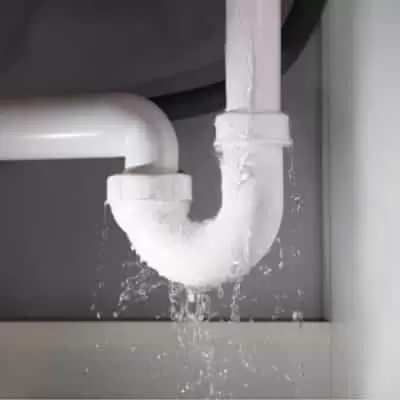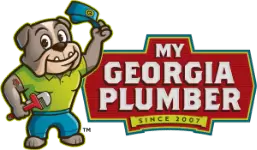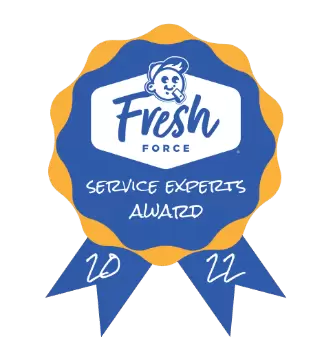
Locations to check
Most of your plumbing is hidden inside walls, in the attic, in the crawlspace, and so on. Usually those are not the ones leaking though. Instead, here is a list of the most common locations where leaks occur:
Shut-off valves under sinks, at toilets, at the water heater, at the water mains
Water supply lines under sinks and at toilets
Faucets
Hand sprayers
Sink overflows
Drain pipes
Toilets at the tank connection or base
Water heater
Tip: If there are personal items in the way and blocking access, consider relocating them. When the kitchen or bathroom sink cabinets are crammed full of stuff, leaks can go undetected for a long time.
Checking for leaks – how to:
Here is the recommended process for checking for leaks for each listed item.
Shut-off valves
Test each listed water shut-off valve. For more detailed instructions, see our home maintenance tip #5, Testing Water Shut-Offs.
Water supply lines
Turn on the faucet at each sink. With the water running, look under the sink at the water supply line from the shut-off valve to the bottom of the faucet. Check for any signs of moisture.
Faucets
With the water still running at the faucet, look at the faucet, both from the top and the bottom. Checking from the bottom might require some gymnastics and a flashlight. If applicable, swivel the faucet to the left and right. Check for any signs of moisture.
Hand sprayers
Kitchen and utility sinks sometimes have a hand sprayer. While convenient, they add another possible source of leakage. With the water on, use the hand sprayer a few times. Check all the connections at the hand sprayer and its hose under the sink for any signs of moisture.
Sink overflows
If a sink has an overflow: Close the stopper at each sink and fill the sink until water starts pouring into the overflow. Now check under the sink for leaks at the overflow.
Drain pipes
Now that you have run the faucets for a while and sent some water down the drains, check the drain pipes under each sink. Carefully check each connection from the sink to where the pipe disappears in the wall for any signs of moisture. If the sink has a mechanical sink stopper, check the linkage connection at the drain pipe. This is a common place for leaks.
Toilets
Flush each toilet. Then look carefully around the base of the toilet and at the connection from the tank to the toilet. Also, examine the water supply line to the toilet tank.
Tip: Use a flashlight to better see leaks. Also consider using a paper towel to run along pipes. Any moisture will show up very clearly on the paper towel.
Water heater
Water heaters last anywhere from 6 to 20+ years, depending on the quality and maintenance. The way that water heaters usually fail is that the tank rusts through and water leaks out the bottom – a lot of water! Check all connections at the water heater as well as underneath/around the base for any signs of leakage.
Tubs and showers
Tubs and shower pans are harder to check because they might leak underneath into a closed space that you cannot easily access. If your house has a basement or crawlspace, you can check for leaks from underneath. However, most houses in Tucson do not have that luxury. The best you can do is check on the other side of walls adjacent to tubs and showers for any signs of leakage.
Water pipes
If your house is older and has polybutylene or galvanized steel water pipes, things get a bit more complicated. Polybutylene is a type of plastic water pipe that was used roughly from 1978 to 1996 here in Tucson. These pipes have a higher than normal failure rate due to issues with the material and the connections. Galvanized steel pipes were common in homes until the late sixties. They will rust from the inside out and eventually spring random leaks.
What to do when you find a leak
Notice that I said when, not if you find a leak. You will find one eventually – guaranteed. When that happens, sometimes you might be able to fix it yourself. If it is just a loose connection, you simply tighten the nut or connector. If it is a leaking valve, a leaking water heater, a cracked toilet, a leaking shower pan, you should call a qualified licensed plumber to fix it properly.
When
Put a reminder on your calendar to check for leaks in your home several times a year, e.g. once a quarter.
Tip: Checking for leaks is best done during the week early in the day. If you find a leak, you want to be able to get a plumber to come out quickly and fix it.
If you do not have a plumber on speed dial, click here to find a good plumber in the Tucson, AZ area.
Conclusion
Checking for leaks several times a year is a very important part of your home maintenance program. A water leak in a home can cause extensive damage that is expensive to remediate. You should do everything you can to prevent water damage from plumbing leaks. Catching leaks early is essential to keeping your home healthy and dry.
Bonus tip: While you are crawling around under sinks, you might as well clean out sink drains.







